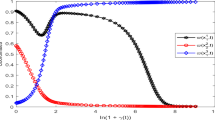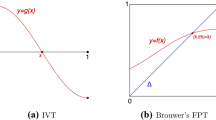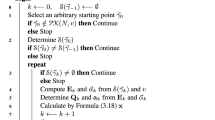Abstract
We show that the value of a zero-sum Bayesian game is a Lipschitz continuous function of the players’ common prior belief with respect to the total variation metric on beliefs. This is unlike the case of general Bayesian games where lower semi-continuity of Bayesian equilibrium (BE) payoffs rests on the “almost uniform” convergence of conditional beliefs. We also show upper semi-continuity (USC) and approximate lower semi-continuity (ALSC) of the optimal strategy correspondence, and discuss ALSC of the BE correspondence in the context of zero-sum games. In particular, the interim BE correspondence is shown to be ALSC for some classes of information structures with highly non-uniform convergence of beliefs, that would not give rise to ALSC of BE in non-zero-sum games.
Similar content being viewed by others
References
Einy E, Haimanko O, Moreno D, Shitovitz B (2008) Uniform continuity of the value of zero-sum games with differential information. Math Oper Res 33: 552–560
Engl G (1995) Lower hemicontinuity of the Nash equilibrium correspondence. Games Econ Behav 9: 151–160
Kajii A, Morris S (1994) Payoff continuity in incomplete information games and almost uniform convergence of beliefs. CARESS working paper # 94-17
Kajii A, Morris S (1997) The robustness of equilibria to incomplete information. Econometrica 65: 1283–1309
Kajii A, Morris S (1998) Payoff continuity in incomplete information games. J Econ Theory 82: 267–276
Lehrer E, Rosenberg D (2006) What restrictions do Bayesian games impose on the value of information. J Math Econ 42: 343–357
Lehrer E, Rosenberg D (2007) Evaluating information in zero-sum games with incomplete information on both sides. Mimeo
Milgrom P, Weber RJ (1985) Distributional strategies for games with incomplete information. Math Oper Res 10: 619–632
Monderer D, Samet D (1989) Approximating common knowledge with common beliefs. Games Econ Behav 1: 170–190
Monderer D, Samet D (1996) Proximity of information in games with incomplete information. Math Oper Res 21: 707–725
Rubinstein A (1989) The electronic mail game: strategic behavior under almost common knowledge. Am Econ Rev 79: 385–391
Shiryaev AN (1996) Probability, 2nd edn. Graduate texts in mathematics. Springer-Verlag, New York
Sorin S (2002) A first course on zero-sum repeated games. Mathematiques and applications, vol 37. Springer-Verlag, Berlin
Author information
Authors and Affiliations
Corresponding author
Rights and permissions
About this article
Cite this article
Einy, E., Haimanko, O. & Tumendemberel, B. Continuity of the value and optimal strategies when common priors change. Int J Game Theory 41, 829–849 (2012). https://doi.org/10.1007/s00182-010-0248-4
Accepted:
Published:
Issue Date:
DOI: https://doi.org/10.1007/s00182-010-0248-4
Keywords
- Zero-sum Bayesian games
- Common prior
- Value
- Optimal strategies
- Interim
- Ex-ante
- Bayesian equilibrium
- Upper semi-continuity
- Lower approximate semi-continuity




